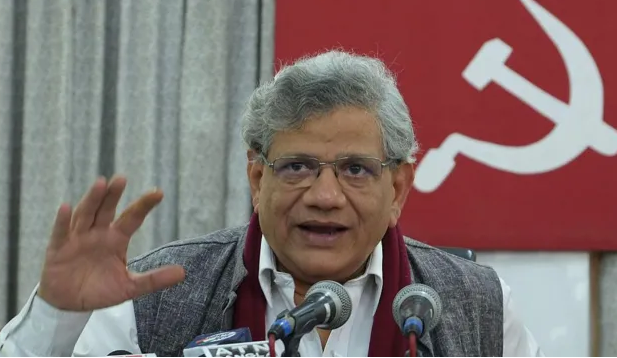
TRIBUTE
Veteran Indian politician and CPI (M) leader Sitaram Yechury passed away on Thursday, September 12, 2024 at the age of 72, following a prolonged illness. He had been receiving treatment for a severe respiratory infection at AIIMS in Delhi. Yechury was a towering figure in India’s political landscape, known for his lifelong commitment to leftist ideals and his pragmatic approach to modernizing the Communist movement. As CPI (M) general secretary, Yechury played a crucial role in shaping the party’s political strategy and forging alliances, notably contributing to the United Progressive Alliance government in 2004. All the politicians including the Prime Miniter of India Narendra Modi have paid glowing tributes to the departed soul.
Sitaram Yechury was a stalwart figure in Indian politics, a leader who dedicated his life to the principles of communism, social justice, and progressive change. Born on March 10, 1947, in the vibrant city of Kolkata, Yechury was shaped by the socio-political currents of post-independent India. His journey from a young student activist to the General Secretary of the Communist Party of India (Marxist) (CPI(M)) is a testament to his unwavering commitment to the ideals he champions.
Sitaram Yechury’s political journey began during his student days at Jawaharlal Nehru University, where he was elected president of the students’ union. Yechury’s academic pursuits at the prestigious Jawaharlal Nehru University (JNU) laid the foundation for his political ideology. Here, he engaged deeply with Marxist theory, honing his analytical skills and developing a profound understanding of the socio-economic challenges faced by the marginalized sections of society. His involvement in student politics marked the beginning of a lifelong commitment to activism, where he emerged as a prominent voice for the rights of students and workers alike.
Over the decades, he held various significant roles, including Rajya Sabha member and head of CPI(M)’s International Department. His efforts to blend India’s Left ideology with the nation’s socio-political fabric marked him as a pragmatic leader deeply invested in social justice causes. He was instrumental in engaging the party with cultural movements and was known for his multilingual, approachable persona.
As a leader, Yechury always prioritized the concerns of the downtrodden. Throughout his political career, he passionately advocated for land reforms, education, and healthcare, recognizing these as fundamental rights that should be accessible to all. His efforts to address issues of poverty and inequality reflected his belief that economic justice is a cornerstone for a truly democratic society. Yechury’s ability to articulate the grievances of the common people earned him respect not only within his party but also among broader sections of society.
One of Yechury’s most significant contributions has been his role in shaping the CPI(M)’s policies and strategies in a rapidly changing political landscape. Under his leadership, the party sought to adapt to contemporary challenges while remaining rooted in its ideological heritage. He was instrumental in fostering alliances with like-minded parties and organizations, recognizing that collective action is essential to combat the rising tide of communalism and authoritarianism in India.
Yechury’s tenure in the Rajya Sabha, where he served as a member for several terms, allowed him to effectively voice the concerns of his constituents on national platforms. He consistently raised critical issues, from economic policies to social injustices, connecting the dots between local struggles and national narratives. His eloquent speeches and incisive critiques made him a formidable presence in parliamentary debates, earning him admiration even from political adversaries.
In addition to his political acumen, Yechury was known for his intellectual rigor. A prolific writer and thinker, he contributed to numerous publications, articulating his vision for a more equitable society. His writings often reflect a deep understanding of global political dynamics, emphasizing the importance of solidarity among oppressed peoples worldwide. Yechury’s ability to draw lessons from international struggles and apply them to the Indian context demonstrated his commitment to a global perspective on justice and equality.
Yechury’s leadership didn’t come without challenges. The CPI(M) faced significant electoral setbacks in recent years, particularly in its stronghold of West Bengal. However, rather than retreating in despair, Yechury embraced these challenges as opportunities for introspection and renewal. He advocated for a re-evaluation of the party’s strategies, emphasizing the need to reconnect with grassroots movements and the changing aspirations of the youth. His resilience in the face of adversity exemplifies the spirit of a true leader—a person unafraid to confront difficulties and seek innovative solutions.
Moreover, Yechury’s commitment to secularism and pluralism in India remained pivotal in countering the divisive politics that threaten the fabric of the nation. He consistently spoke out against communal violence and discrimination, advocating for a society where diversity is celebrated rather than feared. His inclusive vision for India resonates with many who aspire for a harmonious coexistence among various cultures and religions.
As we reflect on Sitaram Yechury’s contributions to Indian politics, it becomes clear that his legacy transcends mere political achievements. He embodied the ideals of compassion, resilience, and intellectual rigor. His lifelong dedication to the causes of the marginalized and his unwavering commitment to justice serve as an inspiration for future generations of leaders. In a world rife with challenges, Yechury’s vision of a more equitable, just, and inclusive society will always remain relevant for times to come.
Sitaram Yechury was not just a politician; he was a beacon of hope for those who dream of a better India. His life’s work is a reminder that the struggle for justice is ongoing and that true leadership lies in the ability to listen, learn, and act in the service of the people. As we honor his contributions, let us also commit ourselves to the ideals he espouses, ensuring that the fight for a just and equitable society continues, fueled by the passion and determination that Yechury exemplified throughout his glorious political career.
His death marks the end of an era for the CPI (M), and his body will be donated to AIIMS for medical research as per his wishes. He is survived by his wife, Seema Chishti, and his children and his legacy will continue to influence India’s political discourse.
(Author is Editor in Chief, The Daily Rising Kashmir)









